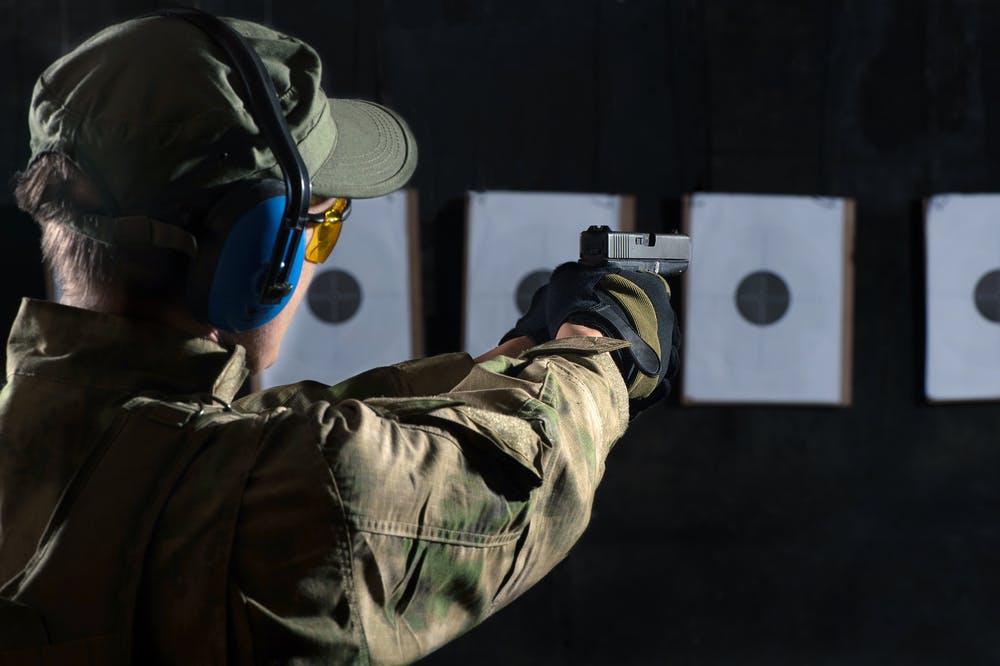My gunslinger husband is teaching my soon-to-be/fast-approaching gunslinger status brother to shoot. On a recent practice someone in the group asked why they needed to practice “weak hand” shooting.
Because it can save your life, Bob repeated to my brother Tom.
Misunderstanding the motivation in the overheard conversation I asked why they didn’t want to practice.
It’s not that they don’t want to practice – it’s that they don’t consider why they should practice, Bob said to me.
The NRA pistol course makes you take all four grips:
Strong hand supported
Weak hand supported (both are called free-style)
Weak hand only
Strong hand only
The need for weak hand supported is usually questioned; one reason for it is you might want to shoot the weak hand side of a cover without exposing yourself; in other words when you’re shooting strong hand (from your strong side of cover) you expose more of yourself around a cover but in weak hand you have the advantage of exposing less of yourself around a cover.
Of course this applies more to new shooters because experienced shooters have been trained. This is stuff taught in basic classes. Of course, some may disagree. Everyone has an opinion. My preferred firearm is a 1911 style pistol but I carry a Glock because I should learn how to use it because it’s a totally different ergonomic.
I continued frying up the chicken in the pan, turning it as I turned the theme over in my mind and drifting out of the conversation as theirs turned to the afternoon’s results and the guy who kept dropping his gun and the new holster my brother had just bought that didn’t seem to do something or other just right and thought about how reluctant I always am to try things I am weak at and what the reasons are behind that reluctance.
In our lines of work we tend to practice to our strengths way too much and not to our weaknesses. Of course this makes sense but should it?
We get immediate satisfaction (and recognition) from doing well. If we developed a practice routine that worked on our weak spots (as well as our strengths) what might happen?
I suspect a great deal of satisfaction and pleasure would follow seeing weak areas improve; it just may not come quickly.
There’d be pain involved.
There’d be some suffering.
All that pales, though when the pleasure and satisfaction breaks through and the added skill strengthens what we already know.
My challenge would be to learn Internet sourcing. It doesn’t appeal to me because I think of it as clumsy and time-consuming but standing there, turning and contemplating the browning of that chicken I was thinking that maybe that was my weak hand just not wanting me to use it; that maybe it’s my weak hand that’s clumsy and it’s my thinking that’s flawed on this. I always think it’s phone sourcing that exposes less of myself in cover; maybe – just maybe if I strengthen my weak hand – my Internet sourcing skills – my weak hand might be what would truly expose less of myself.
Oh, the pain.
Oh, the suffering.
I’m willing to try.
So, for those of you who this might make some semblance of sense for and who have been unwilling (to this point) to try phone sourcing, try this in the near term:
Do just 10% of your sourcing with the phone. It will soon strengthen your overall sourcing results and become a stronger asset.
By the way phone sourcing is not “calling in” to a company once you find a name on the Internet to check if the person is “still there” or has the same title. It’s calling in to a company when you don’t know who someone is and finding out. It’s also not finding someone on the Internet and calling that person to see if they’re interested in a job. That’s recruiting and if you’re doing this make sure you’re being paid to do it (sourcing PLUS recruiting wage.)
Does anyone have any tips for me about Internet sourcing?
“I am the weapon; my gun (phone) is the tool.”
